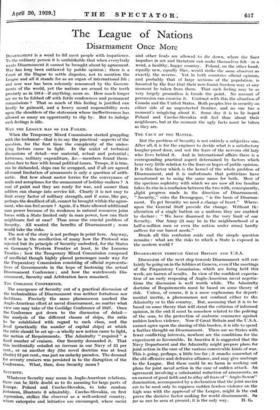WHY THE LEAGUE HAS so FAR FAILED.
When the Temporary Mixed Commission started grappling with the technical—that is to say the practical—aspects of the question, for the first time the complexity of the under- lying factors came ta light. In thp midst of technical discussions of detail—war material, actual and potential ; fortresses, military expenditure, &c.—members found them- selves face to face with broad political issues. Troops, it is true, can be disbanded, ships can be scrapped, and if all are agreed all-round limitation of armaments is only a question of arith- metic. But how about motor lorries for the conveyance of mails and aeroplanes for the amusement of holiday-makers ? A coat of paint and they are ready for war, and sooner than soldiers can change into service kit. Clearly it is not easy to limit every factor of military strength, and if some, like gas, perhaps the deadliest of all, cannot be brought within the agree- ment, who can feel secure ? Again, if a State allowed additional man power because of its weakness in natural resources joins forces with a State limited only in man power, how can their neighbours feel at ease? Thus arose the crucial problem of Security. All wanted the benefits of Disarmament ; none would take the risks.
The rest of the story is not perhaps in point here. Anyway, it will be in the recollection of many how the Protocol was rejected but its principle of Security embodied, for the States on Germany's Western Frontier at least, in the Locarno Treaties ; how the Temporary Mixed Commission composed of unofficial though highly placed personages made way for the Preparatory Commission consisting of official representa- tives of Governments in the hope of hastening the actual Disarmament Conference ; and how the watchwords Dis- armament, Security and Arbitration have remained.
























































 Previous page
Previous page